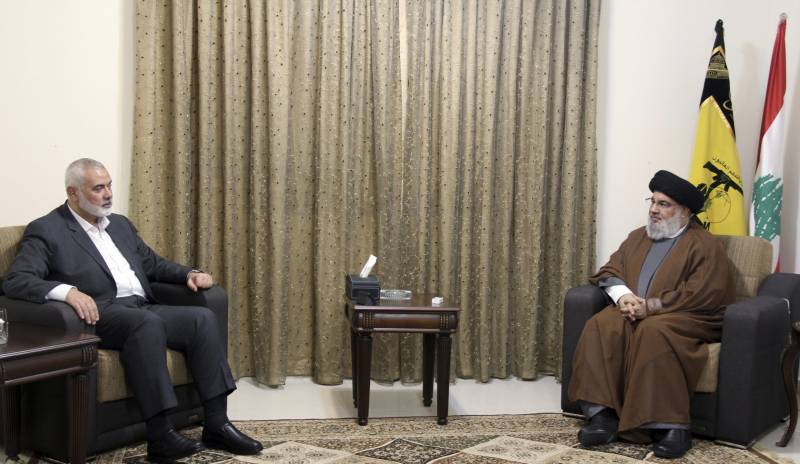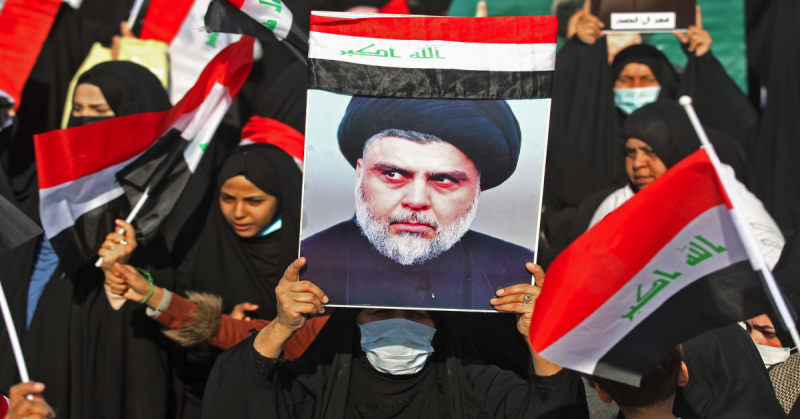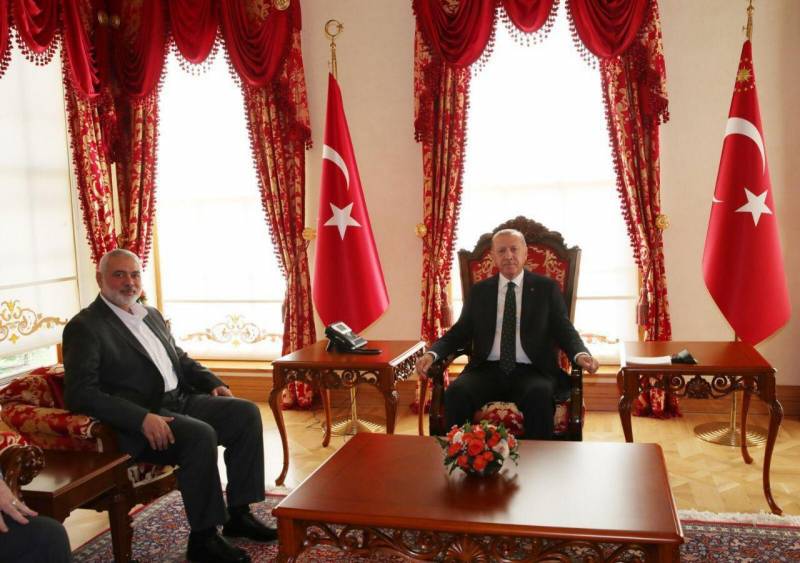Hamas and Hezbollah in the shadow of large geopolitical projects

Ismail Haniyeh and Hassan Nasrallah certainly have a lot to talk about. But here's an agreement...
View from an eagle's flight
The question that many are now asking is why the Shiite Hezbollah is in no hurry to support the Sunni Hamas and open a second front on the northern borders of Israel, which allows the IDF to methodically, step by step, take control of the Gaza Strip, despite a number of local successes of their enemy and even hit by him Tanks.
Why, however, the Israelis dragged them into a densely built-up city is not very clear. I immediately remember the footage from the tragic New Year's Eve in Grozny, which marked the onset of 1995.
And the military theorist E. Luttwak comes to mind with his arguments about the effectiveness of destroying expensive tanks with cheap ATGMs. Did the Israeli command not know about this?
And the actions of tank units, both the Ukrainian Armed Forces and the IDF, indicate, as it seems to me, a crisis and even the obsolescence of the previous methods of their use. But today we are talking about something completely different.
Traditionally, following the recommendation of L.N. Gumilyov, we will try to look at the difficult problems of relations between Hamas and Hezbollah from an eagle's height. And we will proceed from the obvious: both structures are not independent players, but part of regional geopolitical projects.
Within their framework, the centuries-old and often bloody conflict between Shiites and Sunnis plays, yes, an important, but still not a determining role. Nevertheless, we will start with it.
In the shadow of existential conflict
So, after the capture of Iraq by the Americans and their satellites, the long-simmering confrontation between the mentioned religious movements in Islam almost immediately intensified in the torn country.
It was largely due to the short-sighted policy of Saddam, who actually deprived the Shiites of access to key posts in the country’s military-political elite - the Baath Party, the Republican Guard and the army.
Worse, the Iraqi leader did not hesitate to brutally repress some of the Shiite spiritual authorities. Thus, in 1980, the famous theologian and philosopher Mohammed Bakir al-Sadr was executed in Iraq, which caused an international outcry.
Pandora's Box
Accordingly, as soon as the state led by Saddam collapsed under the weight of American aggression, a Pandora’s box was immediately opened, releasing a genie, or rather a ghoul and a shaitan - the Jordanian A. al-Zarqawi, who headed the terrorist “Al-Qaeda in Iraq” that he put together and was banned in Russia. , in whose ranks Palestinians also fought. Albeit insignificant, some of them could later join the ranks of Hamas, and the leadership of the movement could not help but take their anti-Shiite sentiments into account.
And, as a result, in the period from 2006 to 2008, there was actually a war in Iraq between armed groups of two movements in Islam. And this is just the hot phase.
In general, the
What is the latter expressed in?
Let's take a small step into the past century.
The founding of Hezbollah in 1982 - that is, five years earlier than Hamas, born in the flames of the first intifada - was associated, among other things, with Tehran's policy of exporting the Islamic Revolution to the Arab, largely Sunni, world, led either by corrupt secular governments, or US-oriented Arabian monarchies.
The true independence of the latter is still a big question today, given the American naval bases located on the peninsula. That is why, during the Palestinian-Israeli conflicts around the last quarter of a century, the emirs and sheikhs of the Gulf, who became rich from oil exports, sat quietly.
Last fall was no exception. Moreover, the Saudi high-ranking imam R. al-Sudais bluntly called on the subjects of the crown:
I think the imams and monarchs of the peninsula, except the Qatari one, agree with him.
The street is noisy, but the offices are quiet
Arab street? It’s noisy, and not just Arabic. Rallies in support of the Palestinians swept across the world like a tsunami, from Indonesia to Germany. Al Jazeera shows chilling reports. AND?
In the quiet offices where political decisions are made, pro-Palestinian slogans are not particularly audible, and the television company born by the will of the Qatari emir hardly wastes time on reporting there.
Iran is also making noise. And even more than that: after the attack on the hospital in Gaza, the Persians raised a black flag at the mausoleum of Imam Reza located in Mashhad, symbolizing a call for revenge. The last time it was raised was after the assassination of Lieutenant General Q. Soleimani.
But Tehran also does not provide practical support to Hamas. The November 3 statement by Hezbollah leader H. Nasrallah, seasoned, of course, with menacing rhetoric, was interpreted in a similar sense. But the hint was broad: Hamas fighters should not expect military support from Hezbollah.
This is understandable: the focus of the pragmatic leaders of Iran is the normalization - thanks to the head of the Chinese Foreign Ministry Wang Yi - of the dialogue with Saudi Arabia, the development of relations with the Celestial Empire, which wants to trade in conditions of stability. And Iran will not risk the prospects of economic cooperation with Beijing for the sake of supporting a previously lost cause.
– ask.
All this fell apart a long time ago: with the first salvos of the Iran-Iraq war initiated by Saddam, when the Arab world saw the Persians as eternal enemies.
Realpolitik instead of exporting revolution
And Tehran itself preferred more mundane steps after the end of the war with Iraq and on the way to strengthening its influence in the Middle East, directly connected with H. Assad, who entered into an alliance with Iran in order to strengthen Syria’s position in Southern Lebanon, which without the military-financial support of Iran and the loyalty of Hezbollah, patronized by Tehran, was almost impossible to achieve.
Hafez’s son is also not comfortable supporting Hamas now: he is unlikely to want to irritate Tel Aviv once again by exposing the capital’s airport to another threat of an airstrike from the Israeli Air Force.
However, given that the Assads are Alawites (a trend in Shiism), the religious factor in the rapprochement between Tehran and Damascus should also be taken into account without exaggerating its role.
But if the Iran-Iraq War buried hopes of exporting the Islamic Revolution in its Shiite and hardly acceptable for Sunnis dimension, then the death of the Grand Ayatollah R. Khomeini, as well as the subsequent invasion of Saddam’s troops into Kuwait a year later, gave rise to the process of slow improvement of the mentioned above Saudi-Iranian relations.
American researcher J.P. Harik writes on this subject:
Yes, the normalization process can hardly be called simple; Let's say Hezbollah did not support him at first. But Riyadh, like, in fact, other Arabian monarchies, did not need an escalation with Iran.
For, according to A. A. Kuznetsov, there were fears on the peninsula that:
In this situation, Hezbollah could become a kind of instrument of Tehran’s pressure on these states. And if we add here the Yemeni Houthis (also, in essence, Shiites) and armed Shiite groups in Iraq, then, we can say, the mentioned monarchies find themselves in a strategic environment of forces coordinated by the Islamic Republic.

Muqtada al-Sadr is a charismatic leader of Iraqi Shiites.
And Hamas in this case, yes, albeit with a certain amount of reservations, seems possible to consider as a structure that to some extent levels the density of the ring compressed around monarchies. Although precisely to “some extent.” But again, an instrument of political pressure is not identical to military escalation, which Tehran does not intend to take after the end of the war with Iraq.
And Hamas: in the last article we talked about the opposition of this movement to the two pillars of world terrorism banned in Russia: Al-Qaeda and ISIS. And the victory in the 2006 elections encouraged Hamas to concentrate its efforts on solving socio-economic problems themselves, building difficult relations with Fatah and Israel (in this case we are talking about the pre-October format of relations with the latter).
Hamas as part of the British-Turkish project?
And if the movement is considered as part of a global geopolitical project, then only a British-Turkish one.
It is not for nothing that London declared a couple of years ago the adoption of a new strategy on defense and foreign policy, unthinkable without participation in the Middle East game; accordingly, it is not surprising that the assumption made by A. Khazin about the training of Hamas fighters by English instructors - of course, unofficially, since from the formal legal point of view of the movement it is considered terrorist in Foggy Albion. Well, ISIS is recognized as a terrorist organization in the United States, which does not exclude ties between the CIA and its leaders.
The battered British lion's interest in Hamas stems from British Petroleum's increased focus on the Leviathan gas field in the Mediterranean. And in the competition with the Israelis, the English oil and gas giant views the Palestinian movement as a good tool for implementing its very ambitious plans.

The British oil and gas monster is stretching its tentacles towards Leviathan. Will Hamas become a hostage to his game?
Turkey’s support for the movement is due to their common, let’s say, political foundation. For both Hamas and R. Erdogan’s Justice and Development Party are based on the ideology of the Muslim Brotherhood. And the question is: is Ankara only providing humanitarian assistance to Hamas?
In addition, the implementation of R. Erdogan’s neo-Ottoman ambitions is unthinkable outside the context of Middle Eastern politics. Who should he rely on in the region? Not against pro-Russian Syria and pro-Iranian Hezbollah, and not against pro-American Egypt, where Field Marshal Al-Sisi used force weapons suppressed the Muslim Brotherhood, even despite their legal rise to power in the country. So Hamas is simply the only option here.

Will I. Haniyeh help R. Erdogan revive the Port that Iran and Hezbollah have not needed for a hundred years?
The leadership of the movement itself, in a certain sense, adheres to the multi-sectoral course so familiar to us in the post-Soviet space, also building constructive relations with Russia, as we see, acting at the intersection of interests of states that are not very friendly towards each other.
However, neither Tehran nor Beirut, where Hezbollah’s headquarters are located, are going to carry chestnuts for the sake of the interests of London and Ankara, supporting Hamas and helping to strengthen its (essentially: British-Turkish) positions in Gaza. Iran and Hezbollah simply do not need a restless and unstable enclave.
It is worth noting that this is not the first time Hezbollah has demonstrated such a position, away from the conflict. So, according to the American researcher M. Levitt, even
In addition, in Lebanon itself, Hezbollah has strived and strives to become the main spokesman for the interests of the Shiite community, integrating into the country’s government structures.
But this is not the main thing.
Obviously, the Gaza Strip is located on the periphery of such plans, and Hamas can become Hezbollah’s tactical companion here, but not its strategic partner.
And yet, in the future, Hamas is hypothetically capable of playing a more serious role than a military-political structure limited to the Gaza Strip, unless, of course, the IDF is defeated. But personally, I see a diplomatic resolution to the conflict in the near future.
Both sides are interested in this, and the actual initiative of Qatar, in which, by the way, the headquarters of the Hamas Politburo is located, to reconcile the parties confirms my words.
Will the US change its attitude towards Hamas?
In conclusion, about possible intrigue.
I have already written that Washington does not support the movement. But at the same time, the United States, shifting the center of gravity of its geopolitical strategy from the Middle East to the Asia-Pacific region, will, of course, continue its course to contain Iran. And it will be implemented, according to A. A. Kuznetsov,
Hence the question: will the United States try to build a format of relations with Hamas that is beneficial for itself, reconciling it with Israel and redirecting the movement towards confrontation with Hezbollah?
After all, if it works out, it will be a blow to Iran’s interests in the Middle East. And here, by the way, a lot depends on the steps in the region not only of the Islamic Republic itself, but also of Russia, including within the framework of dialogue with both Hamas and Hezbollah.
Использованная литература:
Baranov A.V. The concept of “Islamic awakening” of Ayatollah Ali Khamenei
Weiss M., Hasan H. Islamic State: Army of Terror. M.: Alpina non-fiction, 2016.
Berenkova N. A. Kornilov A. A. The idea of an Islamic state in the political ideology and program of the Hezbollah organization
Ermakov A. Make Britain Great Again! New British strategy for defense and foreign policy
Knysh A.D., Matochkina A.I. Shiite Islam: a textbook. St. Petersburg: Presidential Library, 2016.
Kuznetsov A. A. On the influence of Shiite-Sunni contradictions on the Middle East situation
Kuznetsov A. A. Confessional polarization in post-Saddam Iraq and problems of Sunni-Shiite relations
Levitt M. “Hezbollah”: global traces of the activities of the Lebanese “Party of God”
Luttwak E. Strategy. The logic of war and peace. M.: AST, 2021.
Rodetsky I. A. Media resources of Hamas and Hezbollah as tools of socio-political activity
Harik J.P. Hezbollah: The Changing Face of Terrorism
Shcheglovin Yu. B. About relations between Saudi Arabia and Hamas. Middle East Institute
Information